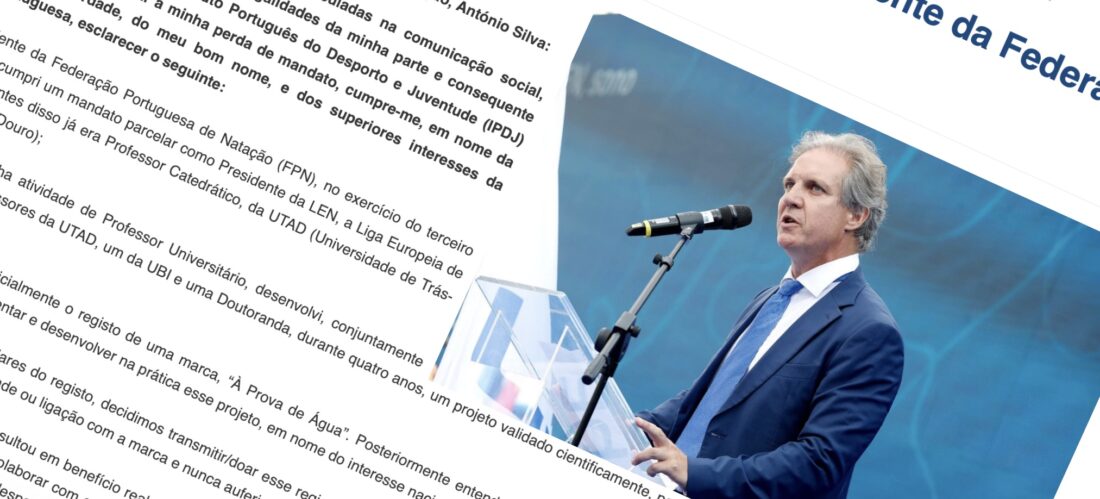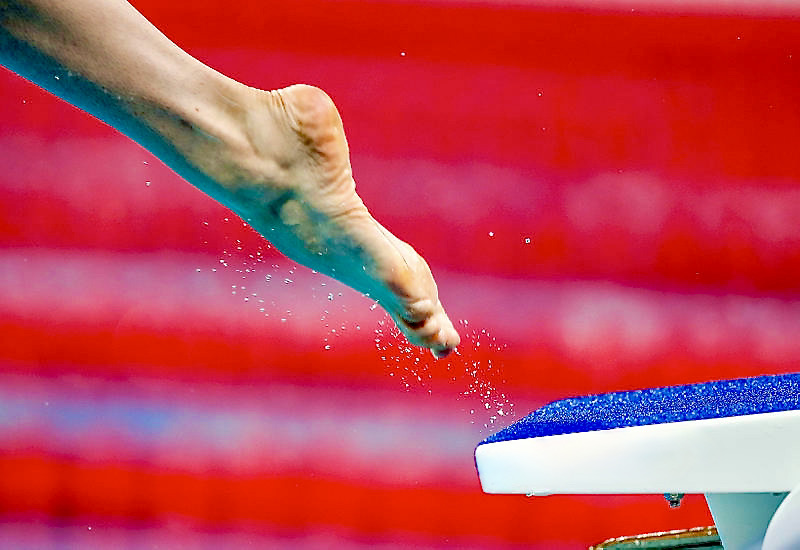FPN Not A Monarchy Nor An Anarchy, Assembly Told In Latest Twists In Silva Saga

Editorial. The Portuguese Swimming Federation – FPN – “is not a monarchy and can never be an anarchy”, a senior member of the general assembly, has told fellow delegates in an appeal to remove president António Silva’s hand from the steering wheel as president of an organisation he must be dismissed from by the end of January if the entire regulator is to lose its funding and legal status to run aquatics in Portugal.
The appeal from the assembly floor for integrity and an end to the omertà members point to when accusing the FPN board of silence in the face of a Government ruling follows the latest twist in the Silva saga: in a statement at the weekend, the president declared himself “self-suspended” from his role “with immediate effect” but almost three days on, the president of the general assembly, Alberto Borges, has yet to make any suspension official but must do so by the end of the month at the latest.
State of Swimming understands the President of the Portuguese National Assembly, Augusto Santos Silva, and the Portuguese Institute of Sport and Youth (IPDJ) that ordered Silva’s dismissal, have been asked to intervene by members of the Portuguese swim community concerned with Silva’s latest moves.
Borges is under government instruction to dismiss Silva after a five-month integrity inquiry ruled against Silva in favour of whistleblower Alexandra Jorge, who resigned as general assembly secretary in spring 2023 after she “witnessed some situations on the part of the FPN Management that, in my opinion, may be in contradiction with the most basic legal principles” and did “not want to be bound by certain decisions that in my opinion are unequivocally incorrect and, as I said above, violate the most elementary principles.”
The IPDJ agreed with her and, with the approval of the Minister of Sport, instructed the FPN to dismiss Silva on grounds that he had broken the Legal Regime of Sports Federations (RJFD), specifically Article 51, which dictates the loss of mandate when “the heads of federative bodies who, in the exercise of their functions or because of them, intervene in a contract in which they have an interest, for themselves, as business manager or representative of another person , and also, when your spouse, any relative or similar in the direct line or up to the 2nd degree of the collateral line or any person with whom you live in a common economy is interested in it”.
Borges has until mid-February, at the latest, to act on the dismissal order (15 days from the IPDJ decision to “begin” the process through which dismissal will take place, then up to 15 takes for the decision to actually be taken and dismissal enacted). If it fails to comply, the FPN faces disqualification of its entire organisation, including an immediate withdrawal and cessation of funds that pay salaries, national team costs and much else.
Mutterings from the Silva camp suggest that Portugal’s March general election means that the FPN is safe to do whatever it wants because of the rule that forbids incumbent Governments from taking “major policy decisions” in the last 10 weeks in office before the national poll.
That, say critics, is laughable on three counts
- Asking institutions to comply with the law is not a “major policy decision”: nor a shift in policy – its the law.
- If the current Government wins the March poll, the FPN will simply face the same threat of extinction, just a month later; while there is no suggestion from opposition parties that they wish to resolve the Legal regime law for sports organisations, which is linked to how the state spends its money and provides oversight of public money.
- Precedent has been set – and how!
It was late 2022 when the IPDJ cited the legal regime for sports federations when instructing the Portuguese Judo Federation to dismiss its president. The president’s friends rallied, refused and so, the Portuguese Government abolished the lot of them, removing funds, status and legal rights, including the right to organise a national team. That sparked a change of heart: the members decided to hold a new vote and dismissed the president rather than see themselves all shoved off a cliff with him. So much for herd instinct.
So, now it’s the turn of swimming and the FPN as the António Silva saga plumbs new depths of farce and challenges the entire reform process at World and European Aquatics with every passing day on the way to a vote of the 52 member nations of European Aquatics in Greece on January 27. If 27 or more nations decide not to back Silva and all the risk that entails, including the obvious threat to their own integrity and continuation in sport, then new elections will be called and the continental body, the global body and their reform processes can reset with a new bill of health and trust.
If the vote goes in Silva’s favour, stand very still and you may well hear a faint chortling sound: it’ll be Cornel Marculescu, the ousted former director of FINA who had to leave because the sport needed an overhaul of the way things were done. A few short years later, swimming will find itself back in a mire of its own making but this time with the revolutionaries who came to power on a ticket of transparency and integrity accused of falling down own the job just a couple of years into the “new golden era”.
Modus Operandi In A Crisis
Silva doesn’t answer questions when he doesn’t want to, neither those of assembly members who say their trust in him has been “compromised” by his failure to give a straight answer, nor by that section of the media asking the questions he does not answer. Instead, he issues statements rebutting the facts set out by those putting the questions he has not answered.
Among those who says he did not get satisfactory answers from Silva is Nuno Recarei, president of the North Portugal Swimming Association.
In his latest letter raising awareness among delegates, including a board he accuses of being silent in the face of the damning IPDJ ruling, Recarei supports Silva’s right to turn to the judicial appeals process, set out by Silva in a statement on the FPN website and announcing his “self-suspension”.
That’s where understanding ends, however. With a nod to Silva’s “Information Note / Clarification” statement, promoted through FPN social media and using FPN branding and making national-media headlines, Recarei tells members of the General Assembly, the ultimate authority of the FPN that the “self-suspension of mandate” appears to have no basis “in the legal and statutory framework”. He writes:

“The FPN is not a monarchy and can never be an anarchy. After several readings of the RGFD [Legal regime] and Statutes, I am unable to perceive any legal framework for a temporary self-suspension of the head of the Presidential federative body in the ways in which it was/is presented to us. For those who are most curious and diligent, I suggest reading the RGFD (attachment) and in particular Articles 22, 23, 39 and 40 of the FPN Statutes.
Nuno Recarei – image: Seeing red – image by Patrick B. Kraemer
“Therefore, I ask the FPN AG Board to, with the urgency and competence required of it, to inform the entire community as to who should be the legitimate President of the FPN in the period between January 23, 2023 and a date still undefined, and which allegedly should be that of the Extraordinary Dismissal session of the General Assembly.
“And who will be the Chairman of the Board of the General Assembly? The first Vice President? A Director chosen by the self-suspended President?”
Recarei’s red flag on taking the keys from a man fallen from grace only to hand them to his closest allies is underpinned by a call for privileges and power to be removed from Silva at a time when he continues to use the president’s office as a campaigning and defence platform: “More attention should be paid to the right to enjoy the benefits and privileges available to the service of the President in office, by a self-suspended President. Specifically, the legality of the use of material, legal, administrative and other resources of the FPN by a holder of a self-suspended federative body must also be clarified.”
Pertinent points in an excellent note. As is the letter sent by Alexandra Jorge to the LEN leadership noting some off the concerns raised by Recarei.
Will Silva and the leaders domestic and European around him respond with integrity? Best to await news without holding breath, especially given the serious concerns the whole saga has raised over the rules and protocols attached to elections that will unfold before the new European Aquatics Integrity Code comes into being one day after the voting on Saturday.
Current rules place Silva in the chair at a Congress at which he is the sole candidate for re-election to president at the helm of the team that put him there. The rules allow him to nominate a co-chair, with approval of Congress. A little pointless if that co-chair is anything other than a completely independent provider of oversight.
That and several other outdated material in the Constitution and Rules of LEN/European Aquatics go hand in hand with questions about the legitimacy of Silva’s candidacy. That must come from the FPN but board and assembly members are among those telling this journalist that they were never asked to give approval.
Sources at LEN suggest that Silva and possibly one of his closest allies, signed the candidacy form. One can only hope not, even if that were to be the ludicrous reality of a law in asses clothing. It’s U.S Presidential poll year and another very controversial one at that, too. Imagine on top of the fire you add a clause that says Biden or Trump need not seek nomination of electors but just nominate themselves with a thumbs up from a few closest allies.
Not exactly democratic. Nor sensible. My enquiries have confirmed that many electoral candidacy approvals do require the signature of the President or General Secretary of LEN but what happens when the candidacy is for the top job? Can the president really sign his own form? I’m happy to provide the answer here if Silva or his right-hand media man drop me a note of explanation.
Again, I won’t be holding my breath. After all, it is now more than two years since I sent a series of reasonable, pertinent and serious questions as a journalist working for The Times to Silva and his British Communications and Media Director Nick Davies, a man who was dismissed by Sebastian Coe from a similar role at the IAAF/World Athletics in a maelstrom of controversy Not a peep, not even a polite “working on it”.
Transparency and a reform commitment, at all levels from domestic federations to World Aquatics, are meaningless where professionalism and integrity are not being observed in very basis measure, key figures in the sport suggest. Obviously, I agree given that one of the key pillars of World Aquatics reform was summed up by this sentence from the reform recommendations team whose advice was approved for action by the World Aquatics leadership:
“… the Reform Committee is mindful to note that FINA’s historical “no communication communication” approach with its members, partners, Athletes and the media must immediately cease.”
Meanwhile, back to Saturday coming and the impending vote on which trust in the reform process hinges.
The new EA Integrity Code goes into far more detail about what is and is not acceptable behaviour for candidates standing in elections but much of that code is written in the assumption that there will be more than one candidate for a role such as “president”. All such codes are fairly pointless and will never be tested in circumstances in which the sole candidate gets to sign his own candidacy, chair the Congress at which elections take place and/or hand over such roles to someone he choses.
The words “independent oversight” are alien in prevailing circumstances. As elections approach, Silva has neither had the integrity to call for a postponement of the elections pending further inquiries and the reason for that is that he has no intention of stepping aside nor stepping down because he knows that just about all those on his EA44 group in power will behave in precisely the way so many in governance down the decades always have: they will do anything possible to remain in power and controlling the agenda. Turkeys tend not to vote for Christmas, especially if they’ve been invited, metaphorically and generally, to live with Orwell’s Napoleon in the big house.
Given all of wriggling and manoeuvring that’s unfolded since a whistleblower shared her concerns with swimming authorities, it looks likely that European Aquatics will proceed with its election in Greece this Saturday at a time when the sole candidate for president has been judged by a national government to be unfit to lead the domestic federation and at a time when a World Aquatics Integrity Unit inquiry is underway.
If nothing halts the refusal of leaders to see just how damaging all of this is to trust in any pledge of reform, transparency and integrity in international and, indeed, domestic, swimming governance, then it will be for the Congress of 52 nations to decide on January 27. Half must agree that Silva is fit to remain in the highest office in Europe and retain a seat as vice-president of World Aquatics.
Ultimately, it is for all to take responsibility, including the waves of folk listed at the foot of this Constitutional Rules page at European Aquatics, including the partners, the sponsors, the strategists, the in-house media, the Congress observers and, of course, those who elect domestic-federation delegates to represent them and their nations in international governance.
Saturday Night Alright For …
As things stand, the re-election of Silva this Saturday is entirely possible – but given what has been and is yet to be revealed, it is unlikely to be sustainable. European Aquatics had a chance to halt, take stock and decide. It could even have opted to delay elections until the ordinary Congress that is already pencilled in for September/October, beyond the Paris Olympic Games.
The fact is that António Silva faces questions that he has simply not answered in all of his defence posturing. And the fact is, as pointed out by members of both the FPN general assembly and European Aquatics, Silva and those closest to him are in control of the information and who sees what and what they answer to.
Meanwhile, I am being told by European Aquatics ethics checkers that a distinction is made “between facts, circumstances, suggestions, opinions, qualifications and allegations”.
Not unreasonable. Until, of course, there is a government judgement against a sports official and that MUST be taken into account. Take, for instance, another scenario, in which a coach is banned by his domestic federation for sexual misconduct and that ban is in force and must be observed but that same coach has engaged a lawyer and claims to be innocent. Would European Aquatics be happy to have that man on deck at the European Championships on the basis that “so far, it’s just one word against another and there’s no legal judgement”?
I think not. I also think that European Aquatics understands that circumstances, suggestions, opinions, qualifications and allegations cannot be dismissed in a day or two when those same circumstances, suggestions, opinions, qualifications and allegations have led to a government verdict against an official after five months of inquiry.
The current position of the European Aquatics leadership has already led to a loss of trust in the pledges of transparency and integrity that the current board boasted about on their way to being elected as the folk who would confine the reasons for their revolution to the past.
As I suggested at the start of this saga, integrity and transparency would have required Silva to agree to a postponement of elections pending Integrity inquiries. That would have given time for proper process, including Silva’s right to defend himself.
What he should not have a right to do is force an agenda in which his inevitable dismissal from the Portuguese federation is delayed until after he has glued himself to the top tables of European and World swimming at risk of disrepute o all should we subsequently discover that his statements fell shy of the truth.
In an interview with this journalist more than two years ago, FINA (now World Aquatics) president Husain Al-Musallam said that he would “find a way” to remove any top-table leader who fell foul of reform commitments.
A reminder:

Until those words echo in the deeds of aquatics leaders, all reform processes must be seen as an egg yet waiting to be hatched.